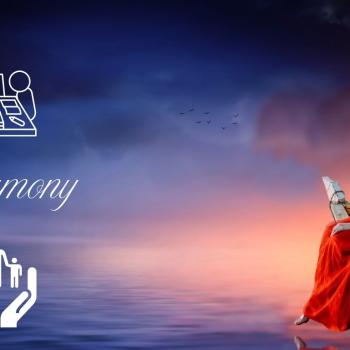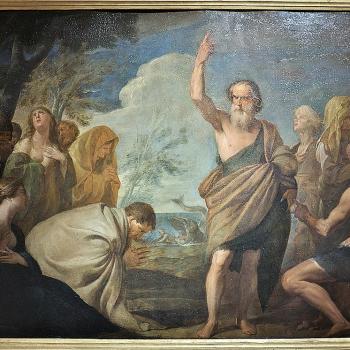Lectionary Reflections
Isaiah 2:1-5
First Sunday of Advent
December 1, 2013
Well, here we go again. The Christian year has turned, and the Advent season is staring us in the face. Too soon, we pastors shout! We just raised the money for next year, or most of it anyway, and wasn't it Labor Day last week? Can Christmas be coming already? It is true that the fake trees have been up in the mall for over a month, and we are heartily sick of "dreaming of a white Christmas" since we do not in fact live in LA—or at least most of us don't. (Full disclosure: I plan to spend this Christmas in LA where my grandchild is about to become a year old, so "White Christmas" may form easier on my sun-drenched lips this year. Eat your hearts out, you snow-bound believers!)
Some of us preachers have faced this time of the year more than others, and we run a serious risk of saying the same things we always say. Here are some possible old chestnuts: "No, we are not going to sing carols in Advent; we save those for Christmas day and after." "I know we have often done a family Christmas pageant in this church, but since Ms. Williams moved, there is no one to take charge. Would you like to take over the pageant? Oh, I thought not." "Who's buying the poinsettias this year? I know the previous pastor did that, but I am not the previous pastor." (Fill in the blank with your favorite).
I have discovered over the years of my time in church that one of the persons who least looks forward to the bells and flock and tinsel and trumpets and pageants and Christmas Eve communion services (I once lead six of those one Christmas Eve long ago) is the pastor of the church. How easy it is to become jaded and rushed and overwhelmed by the oncoming train of Advent and Christmas, despite the cheery music and smiley faces of so many of our people. How do we survive all this one more time?
Well, retirement is an option, I suppose, as is a Christmas trip to the Bahamas, though I imagine the church would not take too kindly your journey to the beach while they are trying to celebrate a journey to the manger without you. What to do? I have a simple suggestion. Read your Bible! You heard me right; read the text from Isaiah once again and receive that jolt of grandeur, that bolt of joy, that charge of hope that flies out of these immortal words each time they appear. A careful reading of them is almost a sure bet to force a struggling pastor to cancel the plane tickets, to defer retirement for one more year, and to rediscover the smile of peace that was lost somewhere between the pulpit and the mall or between the office and the committee room.
Isaiah 2:1-5 begins with words of deep portent: "The word that Isaiah son of Amots (the reading Amoz sounds too much like Amos, so I read Amots) saw concerning Judah and Jerusalem." How exactly does one "see" words? The word "see" more exactly means to "envision," "to conjure up in a vision." It means a good deal more than merely reading words on a scroll; it implies that the words are brought to life, lifted off the parchment, become far more than language. Isaiah envisions them; they have come alive in his seeing, and they can come alive for us who read them over two millennia later. "And it will be in after days that the mountain of YHWH's house will be set up as the chief of the mountains and lifted above the hills, while all nations stream to it" (Is. 2:2). The vision begins with movements of the earth; Zion, God's holy mountain, is rising up higher than all other mountains, and all the nations of the world are flowing toward that mountain and its house, the Temple, like a giant river.
And in the midst of the vast stream of people, many will turn to one another and say, "Come, let us go up to the mountain of YHWH, to the house of the God of Jacob in order that God may instruct us in God's ways, that we may walk in God's paths. Because out of Zion comes Torah, YHWH's word from Jerusalem" (Is. 2:3). One can fairly hear among the fast flowing river of people the bubbling enthusiasm of those eager to hear first-hand the Torah of YHWH, the rich word of God to be found on this now greatest and highest of earth's mountains. And just what is this Torah, this word of God?
"YHWH will bring justice among nations, shall arbitrate among many peoples" (Is. 2:4a). The common translation "He shall judge," I think, puts the emphasis on God as high court judge, adjudicating the wrongs of the earth and handing down judgments for and against the peoples who have come to hear and do Torah. I do not think that is the divine image in the vision. YHWH does far more than don the robes of judge here; YHWH issues the clear word of justice for all of God's people. And as a result of God's Torah, the following amazing actions begin.
"They shall hammer their swords into sickles, and their spears into pruning hooks. Nations shall not raise sword against nation, nor shall they learn war any more" (Is. 2:4b). And that is the Torah of God, that divine word that all nations have come to hear. War is abolished! No longer will sons and daughters be trained to die and kill others; they will have no weapons with which to do such horrible things. All they will now be able to do is reap the grain and prune the trees of the land together. Soon, the promise goes, war will disappear completely from their minds. "O house of Jacob, come! Let us walk in YHWH's light!" (Is. 2:5) Precisely to walk in YHWH's light, in the way of YHWH's Torah, is to reject war and turn to the ways of peace, the ways of shalom. Shalom is not a mere absence of war. Shalom is wholeness, unity, oneness. Shalom is in fact the vision of Genesis 1, a vision of balance and order, a vision of designed unity, a place where the light of YHWH is the first thing made, a light that makes possible the very existence of us all on the earth.





